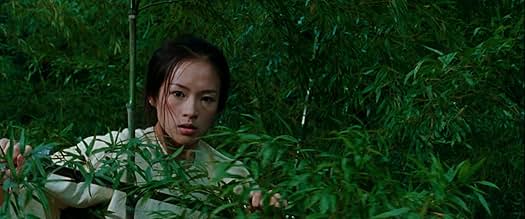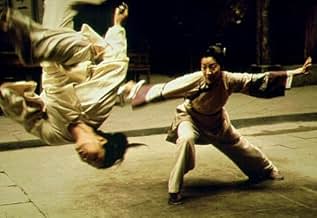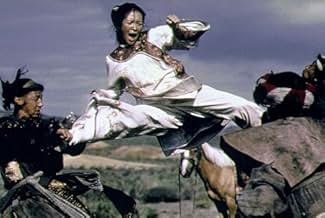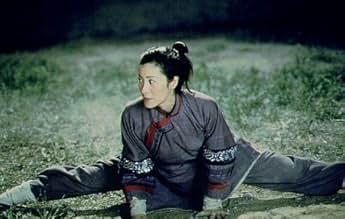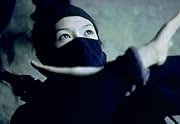A young Chinese warrior steals a sword from a famed swordsman and then escapes into a world of romantic adventure with a mysterious man in the frontier of the nation.A young Chinese warrior steals a sword from a famed swordsman and then escapes into a world of romantic adventure with a mysterious man in the frontier of the nation.A young Chinese warrior steals a sword from a famed swordsman and then escapes into a world of romantic adventure with a mysterious man in the frontier of the nation.
- Won 4 Oscars
- 101 wins & 132 nominations total
Chow Yun-Fat
- Master Li Mu Bai
- (as Chow Yun Fat)
Ziyi Zhang
- Jen
- (as Zhang Ziyi)
Pei-Pei Cheng
- Jade Fox
- (as Cheng Pei-Pei)
Deming Wang
- Tsai
- (as Wang De Ming)
Suying Huang
- Auntie Wu
- (as Huang Su Ying)
Jinting Zhang
- De Lu
- (as Zhang Jin Ting)
Jianhua Feng
- Gou Jun Sinung
- (as Feng Jian Hua)
Zhenxi Du
- Shop Owner
- (as Du Zhen Xi)
Cheng Lin Xu
- Captain
- (as Xu Cheng Lin)
Featured reviews
I just saw this film today. I was totally captivated... when it was all over, and the credits began to run, it took me a couple of seconds to realize where I was. I didn't want to get out of my seat. And once I got out of the theatre, I couldn't even talk about it for an hour or so. I kept running the details over and over in my head. It's rare that a film has such an impact on me. The cinematography was stunning. The special effects were beautifully done. The characters' moves were effortless. The acting was wonderful. I really think that Michelle Yeoh should have been nominated for an Oscar for Best Actress. I thought that the effects and storyline complimented each other brilliantly. There were so many different layers to the plot. There were many things that couldn't be explained with dialogue that were expressed in the characters' faces. This film had lighthearted moments, heartwrenching moments, romantic interludes, inspirational sentiments, wonderful plot twists, superb acting, beautifully done fight scenes, never before seen special effects...it had it all. Some scenes may have been a little over the top, but it's *fantasy*... and yet, after a few brief moments, it somehow became completely believable. That's how much this film draws you in. This is a one of a kind film; there is just no comparing it to any other. It transports you to another place and time. I highly recommend it.
Crouching in the shadows, hiding in the dark, entangled with emotion, an unobtrusive heart, waiting for a moment that may never be revealed, the chance to draw back shades, unlock its passions, remove its seals.
Seamlessly flowing like water over weathered stone, as elegant and enchanting a tale of right verses wrong, good verses bad, learning and forgiving as you'll likely find. The cinematography is sublime, the acting and performances as good as they get, the message as simple as any placed on a screen. Immerse yourself in a truly wonderful piece of cinema that perpetually stands the test of time.
Seamlessly flowing like water over weathered stone, as elegant and enchanting a tale of right verses wrong, good verses bad, learning and forgiving as you'll likely find. The cinematography is sublime, the acting and performances as good as they get, the message as simple as any placed on a screen. Immerse yourself in a truly wonderful piece of cinema that perpetually stands the test of time.
Less than half an hour into the viewing of this masterpiece I knew this would become one of my favorite films - of all time. Only in my wildest dreams (quite literally, this movie has touched me on a personal level) have I visualized such fantastic and precise choreography, so captivating that to take your eyes away during the intense confrontations is to deny yourself the essence of what makes this film so wonderful.
With an artistic license unprecedented, the action scenes are entirely unbelievable but purely the work of a fabulous imagination. The magical settings and the colorful characters fit well into the plot but you will take away the breath-taking martial arts sequences.
With an artistic license unprecedented, the action scenes are entirely unbelievable but purely the work of a fabulous imagination. The magical settings and the colorful characters fit well into the plot but you will take away the breath-taking martial arts sequences.
Fans burnt by George Lucas' "Phantom Menace" found solace in Ang Lee's cosily straightforward "Crouching Tiger Hidden Dragon". The film was greeted with a shrug in China (it was a flop), a country desensitised to wuxia tales, but Westerners loved it. Probably because "Tiger" is basically "Star Wars", with its own assortment of bounty-hunters, Jedis, Sith Lords, princesses, rogues, warriors, villains, henchmen, Yodas, fairy tale romances, teachers, masters, apprentices, chosen ones and much vague talk of destiny, fate and "light" and "dark" sides. When he's not indulging in super choreographed action sequences, Lee's aesthetic is also very Lucasy, which is to say, very John Ford, very David Lean, very Kurosawa, with clean lines, big open spaces, and simple but careful shot selection. What's strange is the film's budget. The film looks like it has the budget of one of those big, state backed Chinese or Stalinist productions, but "Crouching" was made for about fifteen million dollars. Lee gets a lot of mileage out of his budget.
Martial arts fans abhor "Tiger". It's too geared to western tastes, too watered down, and China's been churning out similar wuxia for decades. Why should this one get all the credit? But Lee does put his own spin on the material. His film is more sensual, poetic, graceful, romantic, has a mysterious beauty, and is more delicate than is typical of the genre. His female characters are also given a bigger role than is customary and his action at times seems more like expressive dance.
Repression, restrictions, strict moral codes and self-control are an obsession with Lee. With "Hulk" we had a scientist who struggles to curb his anger, his "Taking Woodstock", "Wedding Banquet" and "Brokeback Mountain" revolved around characters repressing their homosexuality, while "Sense and Sensibility", "Lust Caution", "Ice Storm" and "Woodstock" again all hinged on either repression, free expression or the inhibiting of desire. In "Crouching's" case – the title itself refers to "one who has hidden, suppressed talents" - we have a stifled three-way love between characters called Mu Bai, Shu Lien and Jen Yu, all of whom are prohibited from desire by strict moral/social codes, feudal customs and warrior traditions.
The rejection of these codes is perhaps why the film was shunned by China (and is so popular with western women). Chinese mythology, Taoist philosophy and the hokey "mysticism" of Asian martian arts films (akin to "Star Wars'" "The Force"), all stress an esoteric mode of detachment, a form of denial characteristic of Eastern thought in which the world is seen to be illusory and detached cogitation is seen to be the path to enlightenment. Lee, in contrast, is trading in a more genteel, Western sensibility; a kind of romantic humanism where one is called to ditch Eastern stoicism and embrace the "reality" and "meaning" of human attachments in this life. This tug-of-war is epitomised by a trio of conversations located in each of the film's three acts. In the first, characters called Mu Bai and Shu Lien, who we learn have long had feelings for each another but have denied these feelings to pursue the demands of a Wudan warrior lifestyle, discuss the fact that Mu Bai, when meditating, reaches not "the bliss of enlightenment" but "a place of endless sorrow". For Mu Bai, passions cannot be extinguished and only serve to increase the pull of desire. Mu Bai's conflict – the way clinging to personal affection is contrary to his Wudan ways of detachment – can be found even in Lucas' "Star Wars" prequels, only there Lucas has some monastic ninja kid literally moan about the way his calling prevents him from losing his virginity ("Me want make sexy time but Yoda say no! Wah Wah Wah!").
The second conversation occurs at the film's midpoint, when Mu Bai and Shu Lien finally touch. "Shu Lien," he recoils, "the things we touch have no permanence. My master would say there is nothing we can hold onto in this world. Only by letting go can we truly possess what is real." Shu Lien then brushes aside his Taoism with direct, naive realism: "Not everything is an illusion. My hand is real."
It's in the third conversation that the film breaks away from your typical martial arts movie mysticism and repudiates Wudan philosophy. Here, Mu Bai is dying and Shu Lien urges him to meditate: "Free yourself of this world. Let your soul rise to eternity. Do not waste your breath on me." "I have already wasted my life," Mu Bai responds. "I would rather be a ghost drifting by your side, as a condemned soul, than enter heaven without you." Contrast this with the countless marital arts movies, or even the "Star Wars" franchise, which end with the ghostly spirits of dead warriors, monks and masters hovering contently over the living. Mu Bai is given no supernatural reprieve, no higher plane of existence. He just dies. The film then ends with the recounting of a mountain legend in which a young woman must paradoxically "float away and never return" if she wishes to "return". The whole film hinges on a similar paradox: acting on a desire one desires not to have. It's the paradox of Buddhism: continually desiring to eliminate desire, whereby satiating desire is impossible and it is ultimately desire which blocks the road to desirelessness. This is contrasted with a more Western hedonism, where the hedonist attempts the cessation of desire by "giving in" to them all.
Beyond all this, the film resembles the works of King Hu, Ozu and Ichikawa, the latter two only insofar as it contrasts straitjacketed older generations, and their societal obligations, with oppositional, younger generations. The film's ending suggests that a character called Jen sacrifices her life/love so that Mu Bai and Shu Lien may finally be together.
8.5/10 – Worth two viewings.
Martial arts fans abhor "Tiger". It's too geared to western tastes, too watered down, and China's been churning out similar wuxia for decades. Why should this one get all the credit? But Lee does put his own spin on the material. His film is more sensual, poetic, graceful, romantic, has a mysterious beauty, and is more delicate than is typical of the genre. His female characters are also given a bigger role than is customary and his action at times seems more like expressive dance.
Repression, restrictions, strict moral codes and self-control are an obsession with Lee. With "Hulk" we had a scientist who struggles to curb his anger, his "Taking Woodstock", "Wedding Banquet" and "Brokeback Mountain" revolved around characters repressing their homosexuality, while "Sense and Sensibility", "Lust Caution", "Ice Storm" and "Woodstock" again all hinged on either repression, free expression or the inhibiting of desire. In "Crouching's" case – the title itself refers to "one who has hidden, suppressed talents" - we have a stifled three-way love between characters called Mu Bai, Shu Lien and Jen Yu, all of whom are prohibited from desire by strict moral/social codes, feudal customs and warrior traditions.
The rejection of these codes is perhaps why the film was shunned by China (and is so popular with western women). Chinese mythology, Taoist philosophy and the hokey "mysticism" of Asian martian arts films (akin to "Star Wars'" "The Force"), all stress an esoteric mode of detachment, a form of denial characteristic of Eastern thought in which the world is seen to be illusory and detached cogitation is seen to be the path to enlightenment. Lee, in contrast, is trading in a more genteel, Western sensibility; a kind of romantic humanism where one is called to ditch Eastern stoicism and embrace the "reality" and "meaning" of human attachments in this life. This tug-of-war is epitomised by a trio of conversations located in each of the film's three acts. In the first, characters called Mu Bai and Shu Lien, who we learn have long had feelings for each another but have denied these feelings to pursue the demands of a Wudan warrior lifestyle, discuss the fact that Mu Bai, when meditating, reaches not "the bliss of enlightenment" but "a place of endless sorrow". For Mu Bai, passions cannot be extinguished and only serve to increase the pull of desire. Mu Bai's conflict – the way clinging to personal affection is contrary to his Wudan ways of detachment – can be found even in Lucas' "Star Wars" prequels, only there Lucas has some monastic ninja kid literally moan about the way his calling prevents him from losing his virginity ("Me want make sexy time but Yoda say no! Wah Wah Wah!").
The second conversation occurs at the film's midpoint, when Mu Bai and Shu Lien finally touch. "Shu Lien," he recoils, "the things we touch have no permanence. My master would say there is nothing we can hold onto in this world. Only by letting go can we truly possess what is real." Shu Lien then brushes aside his Taoism with direct, naive realism: "Not everything is an illusion. My hand is real."
It's in the third conversation that the film breaks away from your typical martial arts movie mysticism and repudiates Wudan philosophy. Here, Mu Bai is dying and Shu Lien urges him to meditate: "Free yourself of this world. Let your soul rise to eternity. Do not waste your breath on me." "I have already wasted my life," Mu Bai responds. "I would rather be a ghost drifting by your side, as a condemned soul, than enter heaven without you." Contrast this with the countless marital arts movies, or even the "Star Wars" franchise, which end with the ghostly spirits of dead warriors, monks and masters hovering contently over the living. Mu Bai is given no supernatural reprieve, no higher plane of existence. He just dies. The film then ends with the recounting of a mountain legend in which a young woman must paradoxically "float away and never return" if she wishes to "return". The whole film hinges on a similar paradox: acting on a desire one desires not to have. It's the paradox of Buddhism: continually desiring to eliminate desire, whereby satiating desire is impossible and it is ultimately desire which blocks the road to desirelessness. This is contrasted with a more Western hedonism, where the hedonist attempts the cessation of desire by "giving in" to them all.
Beyond all this, the film resembles the works of King Hu, Ozu and Ichikawa, the latter two only insofar as it contrasts straitjacketed older generations, and their societal obligations, with oppositional, younger generations. The film's ending suggests that a character called Jen sacrifices her life/love so that Mu Bai and Shu Lien may finally be together.
8.5/10 – Worth two viewings.
10Larry-17
There's a telling moment near the beginning of Ang Lee's "Crouching Tiger, Hidden Dragon."
In closeup, we see the rough-hewn, heavy wooden wheels of a peasant cart. They nestle in deep ruts worn into the stone paving blocks of a roadway entering a gated city. The cart rumbles on, its wheels fitting perfectly into the grooves worn by unspoken centuries of just such passing wagons...in one image we see how tradition creates its own paths, how contemporary reality is fabricated to fit such traditions... The camera rises, we see an almost impossible panorama of Peking, the Forbidden City spreading out before us like an Oz extending to the horizon.
What a film this is: a superb action adventure romance with terrific acting and a much-welcome heart underlying the technical superiority.
"Crouching Tiger...", I am told, is representative of a specific literary/cinematic genre in China: Wu Xia...the wizard/warrior piece...magic and martial arts blended. I'm not familiar with the form, but the world portrayed here is a breathtakingly fantastical one. The story is putatively set in 19th century China, but it could be anywhere, anywhen. It is a place of high honor and deep feelings, a place where people are bound by traditions and held captive by their forms. It is also a place of wild and mythic landscapes...from stark desert (thought nowhere do we get that featureless, wide-screen linear horizon seen in David Lean's "Lawrence of Arabia!") to magic misty green mountains with deep dark lakes and steeply cascading streams that come braiding, tumbling down the rockslide heights. High, reedy bamboo forests wave, wondrous, in sighing winds.
In this world people may do amazing things. The flying in this movie -- properly called "wire work" in film terms -- is fantastic. This technique, of course, was not invented by the Wachowski's, but the choreographer of "Crouching Tiger...", Woo-ping Yuen, also staged the wire-fights of "Matrix." Here, the ability of our warrior heros and villains to climb walls, to leap to the rooftops and soar from building to building -- not to mention engaging each other in aerial combat that soars from the peak of a mountain top to the rocks of a mountain stream in a single take -- or to duel on the very tips of dipping, waving bamboo trees -- looks almost plausible, just over the border of the possible, at least. The whole packed-in audience at the big theater at the advanced screening at Pipers Alley in Chicago burst into spontaneous applause several times throughout...
At other moments, I found myself in weepy transport. As I think of the fight in the treetops, right now, I become drippy -- tingly of eye and sinus.
Apart from all else, this is grand storytelling! It has passion, love, revenge...it expresses deep need and longing.
And, yes, the woman are the action hearts of the film! Michelle Yeoh is wonderful...but I've been in love with her for years. Here, she is more mature, quieter, wiser than in any role I've seen her in. Her performance is strong and moving, her face registering, magically, a range of conflicting emotions, hidden secrets, crouching angers, all at once. In acting training we were always told you can't do that. She does it.
Chow Yun Fat, too...I've been a fan of his since I first discovered John Woo's Hong Kong crime thrillers...is the best I've ever seen, as well...magnificent in his silences. Strength without cruelty.
The center of the film is a girl who looks to be about 15! Ziyi Zhang whose date of birth is given as 1979. Zhang is from Beijing, China, and has only one other film credit. She is remarkable. Her story is the film's binding element. And this newcomer holds it together! Holding her own with Yeoh and Chow in both dramatic material and in the balletic martial pas des dieux's that frame the conflicts between characters. She is the "Luke Skywalker" of the piece, if you will...though "Crouching Tiger..." has everything the "Star Wars" saga aspires to: excitement, thrills and magic. Here however, technical fireworks are wrapped heart and deeply resonant spirit. Elements Lukasfilm wanted to have, but which it succeeded in providing only in the most self-conscious way.
By the way: this is an action film, almost uniquely without violence...or, rather, the violence is so stylized, so removed into some mystical realm, that it almost disappears into dance. There is, I believe, only one small splash of blood on-screen. Typically, I don't like that -- figuring that if you're going to do a film where violence is part of it all, where action advances plot, let's have it full-bore, the "Full Peckinpaw," if you will. Here, however, this stylization works beautifully with action sequences that take the breath away and inspire a sense of awe, rather than simply leave you white-knuckled and sweaty.
There are those who will grumble that Jackie Chan (another favorite of mine) does it all for real, without wires and tricks. True enough... But here that exuberance of motion is in service of a grand story and strong characters who carry worthwhile emotional burdens!
I won't be able to wait for the DVD, and will probably see it again, perhaps see it twice before it hits the home-market.
My recommendation: Just go see it.
In closeup, we see the rough-hewn, heavy wooden wheels of a peasant cart. They nestle in deep ruts worn into the stone paving blocks of a roadway entering a gated city. The cart rumbles on, its wheels fitting perfectly into the grooves worn by unspoken centuries of just such passing wagons...in one image we see how tradition creates its own paths, how contemporary reality is fabricated to fit such traditions... The camera rises, we see an almost impossible panorama of Peking, the Forbidden City spreading out before us like an Oz extending to the horizon.
What a film this is: a superb action adventure romance with terrific acting and a much-welcome heart underlying the technical superiority.
"Crouching Tiger...", I am told, is representative of a specific literary/cinematic genre in China: Wu Xia...the wizard/warrior piece...magic and martial arts blended. I'm not familiar with the form, but the world portrayed here is a breathtakingly fantastical one. The story is putatively set in 19th century China, but it could be anywhere, anywhen. It is a place of high honor and deep feelings, a place where people are bound by traditions and held captive by their forms. It is also a place of wild and mythic landscapes...from stark desert (thought nowhere do we get that featureless, wide-screen linear horizon seen in David Lean's "Lawrence of Arabia!") to magic misty green mountains with deep dark lakes and steeply cascading streams that come braiding, tumbling down the rockslide heights. High, reedy bamboo forests wave, wondrous, in sighing winds.
In this world people may do amazing things. The flying in this movie -- properly called "wire work" in film terms -- is fantastic. This technique, of course, was not invented by the Wachowski's, but the choreographer of "Crouching Tiger...", Woo-ping Yuen, also staged the wire-fights of "Matrix." Here, the ability of our warrior heros and villains to climb walls, to leap to the rooftops and soar from building to building -- not to mention engaging each other in aerial combat that soars from the peak of a mountain top to the rocks of a mountain stream in a single take -- or to duel on the very tips of dipping, waving bamboo trees -- looks almost plausible, just over the border of the possible, at least. The whole packed-in audience at the big theater at the advanced screening at Pipers Alley in Chicago burst into spontaneous applause several times throughout...
At other moments, I found myself in weepy transport. As I think of the fight in the treetops, right now, I become drippy -- tingly of eye and sinus.
Apart from all else, this is grand storytelling! It has passion, love, revenge...it expresses deep need and longing.
And, yes, the woman are the action hearts of the film! Michelle Yeoh is wonderful...but I've been in love with her for years. Here, she is more mature, quieter, wiser than in any role I've seen her in. Her performance is strong and moving, her face registering, magically, a range of conflicting emotions, hidden secrets, crouching angers, all at once. In acting training we were always told you can't do that. She does it.
Chow Yun Fat, too...I've been a fan of his since I first discovered John Woo's Hong Kong crime thrillers...is the best I've ever seen, as well...magnificent in his silences. Strength without cruelty.
The center of the film is a girl who looks to be about 15! Ziyi Zhang whose date of birth is given as 1979. Zhang is from Beijing, China, and has only one other film credit. She is remarkable. Her story is the film's binding element. And this newcomer holds it together! Holding her own with Yeoh and Chow in both dramatic material and in the balletic martial pas des dieux's that frame the conflicts between characters. She is the "Luke Skywalker" of the piece, if you will...though "Crouching Tiger..." has everything the "Star Wars" saga aspires to: excitement, thrills and magic. Here however, technical fireworks are wrapped heart and deeply resonant spirit. Elements Lukasfilm wanted to have, but which it succeeded in providing only in the most self-conscious way.
By the way: this is an action film, almost uniquely without violence...or, rather, the violence is so stylized, so removed into some mystical realm, that it almost disappears into dance. There is, I believe, only one small splash of blood on-screen. Typically, I don't like that -- figuring that if you're going to do a film where violence is part of it all, where action advances plot, let's have it full-bore, the "Full Peckinpaw," if you will. Here, however, this stylization works beautifully with action sequences that take the breath away and inspire a sense of awe, rather than simply leave you white-knuckled and sweaty.
There are those who will grumble that Jackie Chan (another favorite of mine) does it all for real, without wires and tricks. True enough... But here that exuberance of motion is in service of a grand story and strong characters who carry worthwhile emotional burdens!
I won't be able to wait for the DVD, and will probably see it again, perhaps see it twice before it hits the home-market.
My recommendation: Just go see it.
Did you know
- TriviaMichelle Yeoh deliberately did not work for a year before filming began so she could concentrate on training and learning Mandarin.
- Goofs(at around 1h 30 mins) During the fight between Yu Shu Lien and Xiou Long, many floor tiles are smashed by Shu Lien. After Shu Lien discards her heavy metal weapon and continues to fight, the tiles appear intact.
- Crazy creditsThe opening title appears in Chinese and English.
- Alternate versionsAn English dubbed version was created for the home video market.
- SoundtracksA Love Before Time
Music Composed by Jorge Calandrelli, Dun Tan
Lyrics by James Schamus, Elaine Chow (Translation)
Performed by Coco Lee featuring Cello Solo by Yo-Yo Ma
Coco Lee appears courtesy of Sony Music Entertainment (Holland) B.V.
Details
- Release date
- Countries of origin
- Official site
- Languages
- Also known as
- El tigre y el dragón
- Filming locations
- Production companies
- See more company credits at IMDbPro
Box office
- Budget
- $17,000,000 (estimated)
- Gross US & Canada
- $128,530,421
- Opening weekend US & Canada
- $663,205
- Dec 10, 2000
- Gross worldwide
- $213,978,518
- Runtime2 hours
- Color
- Sound mix
- Aspect ratio
- 2.39 : 1
Contribute to this page
Suggest an edit or add missing content


